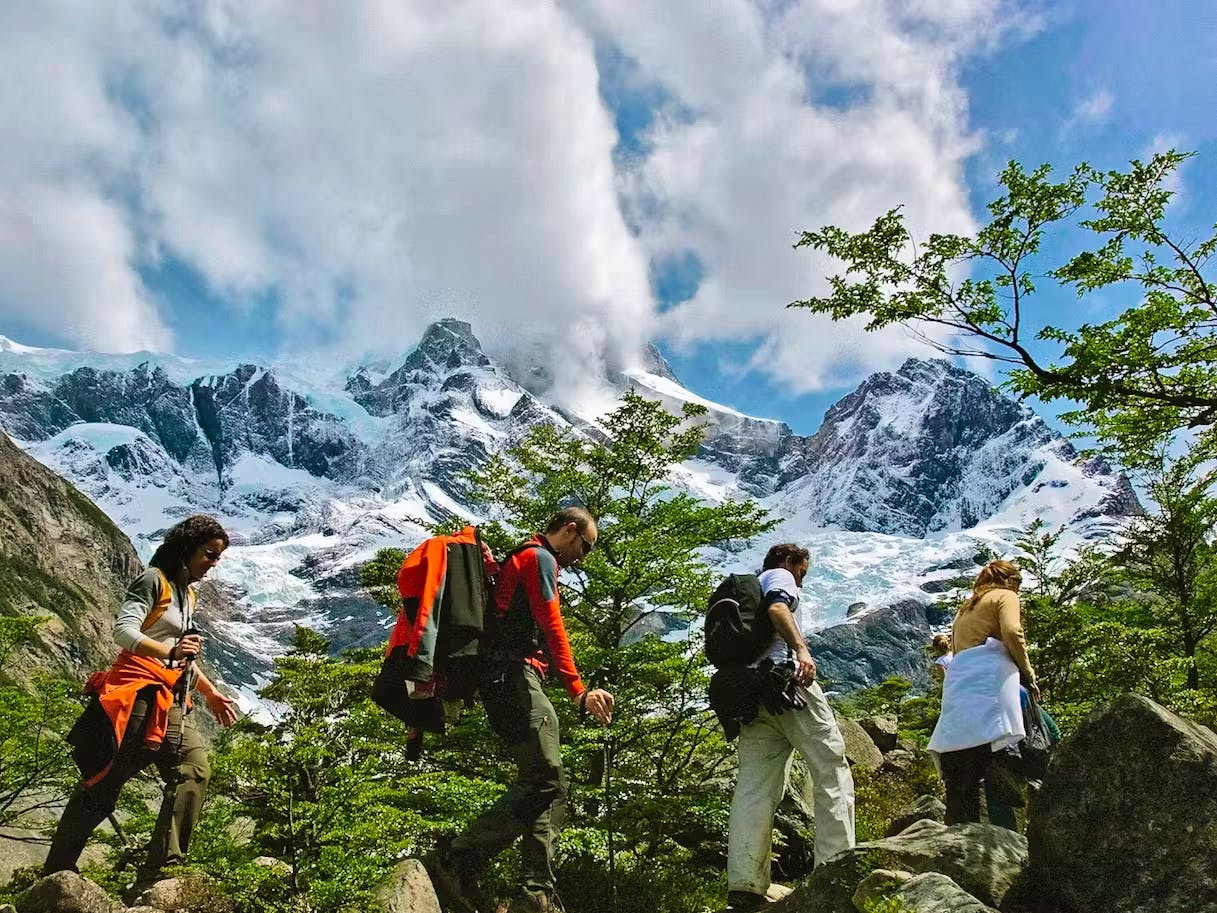Your Ultimate Patagonia O Trek Packing List

1. Start with a Good Back Pack
2. Clothing and Shoes
a) Base Layers
A running top with sleeves that fit well is excellent for keeping you warm while protecting your arms and hands from the sun. These are also light, so they will feel more comfortable and dry quickly. We tend to not recommend cotton shirts, as they may take twice as long to dry and feel bulky for an outdoor activity.
Merino wool socks offer great heel support, are super durable, and dry fast. Bring multiple pairs of these to change into if it rains (prolonged hiking in wet socks is a sure way to get blisters).
Underwear, swimwear (for exploring lakes, pools, and rivers), a fast-drying microfiber towel and handkerchiefs.
Buff/neck gaiter.

b) Bottoms
Hiking pants: You need hiking pants to protect you from the grass and wind. For women, running tights are super light, stretchy, and comfortable and will only take up a little space in your backpack.
Rain pants are a great option for hiking in the fall or winter.
For bedtime, bring a pair of thermal leggings.
c) Outerwear
A rain jacket: Rain is usually the biggest concern on Patagonia's O trek, so bring a robust windproof rain jacket with a hood and zipped pockets.
A fleece jacket for the windy and chilly days.
Bring a sun hat to protect your head and neck from the sun and a beanie for the chillier days.
Warm, windproof gloves.
Bring high UV protection sunglasses with polarised lenses. Being close to the Antarctic ozone hole, Patagonia receives UV-B radiation, and your eyes need extra protection from these harmful rays.


d) Shoes
Hiking shoes: Invest in high-quality hiking shoes that fit well and have ankle support because you will spend a significant portion of your day in them. Your hiking shoes should also be waterproof, breathable, and have excellent grip for days when the trail is muddy.
Lightweight shoes: These can be a pair of Crocs or flip-flops that you can easily walk around in at camp and will dry quickly.
3. Hiking Gear
A 1-litre water bottle with a wide mouth allows for easy refilling. Remember, constant hydration is vital on any hike. Luckily, there are numerous places you can refill your bottle with the park's natural springs (you can use filtration tablets if you refill near a farm - animals can contaminate the water).
Trekking poles: Areas like the John Garner Pass are particularly steep, and the terrain can get muddy, slippery, or rocky. Hiking poles will help you keep steady on such terrain and will be super helpful if you have knee issues. Choose a brand that offers anti-slip handles, anti-shock mechanisms, and a rubber tip.
A GPS watch.

4. Other Personal Items
A small, waterproof day pack for your camera, phone, cash, and other essentials. 220V and 2-pin electronic chargers (you can recharge devices on campsites and refuges).
A small first aid kit with any prescription medication, allergy medicine, painkillers, and ointment.
Bug spray and sunscreen.
Toiletries, including a small shampoo bottle and bar of soap.
Weather-resistant and solar-charging flashlight.
Earplugs for the night because the nights are windy, and you still need good-quality sleep.
5. Essential Documents
Passport and copies. You'll also need a driver's license to rent a car, plus identification documents for minors.
Travel insurance policy copies.
Visa (depending on your country of origin). Generally, citizens of the European Union, the UK, the United States, and Canada do not require one.
Spanish Phrasebook can be useful when learning a phrase or two!
Cash tips for guides. Often, tourist areas will accept US dollars but having some local Chilean Pesos is wise.
A debit or credit card for shopping and other applicable fees.

Self-sufficient O Trek
A sleeping mat or lightweight inflatable mattress (this is comfortable and takes the least amount of space).
A sleeping bag with synthetic fillings (better suited for Patagonia's wet conditions) and a comfort rating between 0°C to -7°C degrees or lower comfort rating of -5°C to -12°C (different manufacturers use different comfort ratings).
All your food. We recommend items that are light while containing plenty of calories and nutrients like oatmeal, fruits, meat or vegan jerky, sausages, bread, protein bars, and beverages. You will also need cooking essentials like a stove, Isobutane fuel canisters, pots, a bowl, and a spoon.

Conclusion
Related Articles:
Patagonia hiking
O trek Patagonia
TrekkingTorress del Paine
Best time to hike in Patagonia
Hiking Patagonia without a guide
Trekking Chile
Find your next adventure
Why Skyhook?
Join over 27,000 Skyhook adventurers who've used our platform to book directly with our vetted local guides, at local prices (we never markup).
Expert Local Guides
Experienced local guides, handpicked by us.
Best Prices
Never pay a markup on the local guide's price.
Exclusive Club
Earn loyalty rewards every time you travel.
Great Social Vibes
Small group tours provide a richer experience.
Stellar Feedback
Over 2,800 reviews, average of 4.9/5 stars.












